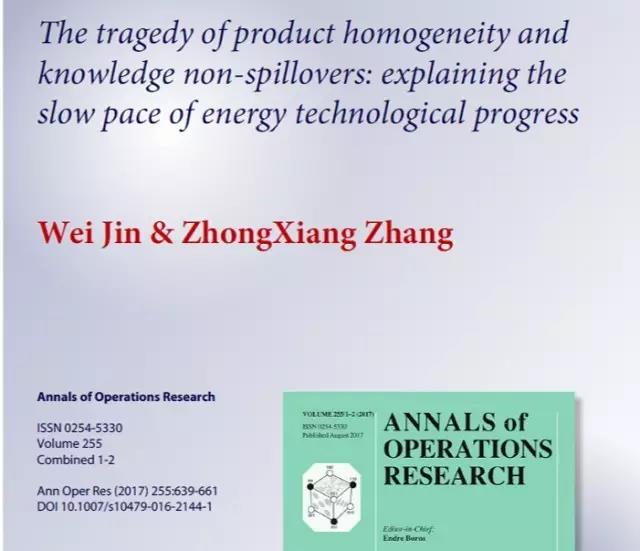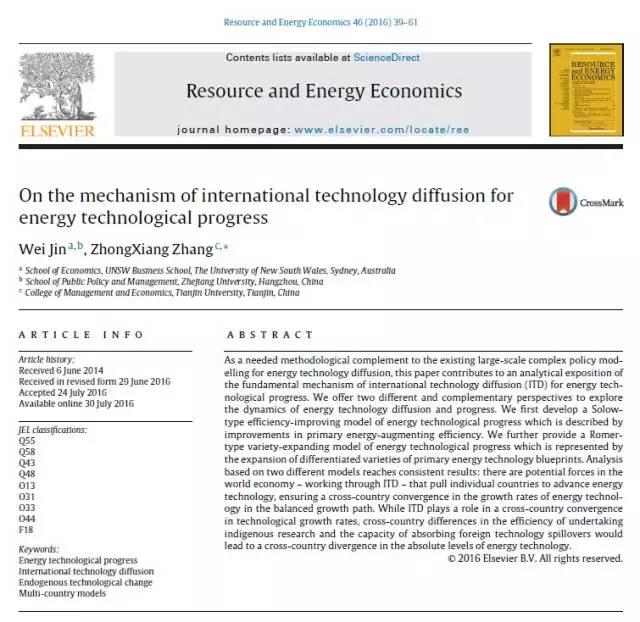时间:2017-07-31

澳大利亚新南威尔士大学商学院大学校长博士后研究员(Vice-Chancellor’s Postdoctoral Research Fellow)靳玮和天津大学马寅初经济学院卓越教授、院长张中祥合作的理论文章“产品同质化和知识无外溢的悲剧:能源部门技术进步速度缓慢的经济学解释”(The tragedy of product homogeneity and knowledge non-spillovers: explaining the slow pace of energy technological progress), 近期在管理科学领域侧重方法的顶级刊物Annals of Operations Research正式发表,文章刊登在卷255,639-661页。这是继“论技术国际扩散对能源技术进步的影响机制” (On the mechanism of international technology diffusion for energy technological progress, Resource and Energy Economics, 卷46, 2016年,39 - 61页。)之后,靳玮和张中祥合作发表的第二篇理论文章。

文章简介
当阿波罗计划成功实现人类登月目标的同时,也随之发明创造了两项新技术:电子信息技术和可再生太阳能技术。两项技术几乎在同一时间取得关键突破,但随后却呈现出截然不同的发展演变路径。相对于电子信息部门,能源部门的技术创新和变革速度显著缓慢,从而制约能源技术转型和绿色经济的发展。
本研究基于产品多样性的内生技术变化模型,分析解释了能源部门较电子信息部门技术进步速度缓慢的经济学原因。发现在分散市场均衡状况下,能源部门较电子信息部门技术进步速度更慢,原因一方面来自市场层面,即电子信息部门具有丰富的产品异质性,而能源产品从终端使用者角度看具有很强的产品同质性,因此难以利用消费者喜欢产品多样化的消费偏好来增加产品需求和市场价值。
另一方面原因来自技术层面,电子信息部门多依靠知识人力资本,而能源部门技术研发多密集依赖设备实物资本,因此难以产生知识扩散外部性来促进技术资本的积累。研究进一步发现在社会最优状况下,能源和电子信息部门皆能获得比分散市场均衡状态下更快的技术进步速度,但是与电子信息部门相比能源部门技术进步速度仍然较小。最后发现,在市场均衡状态下,通过引入能源部门技术研发和产品使用补贴等政策调控手段,能源部门可以实现比电子信息部门更快的技术进步速度。
文章全文参见链接:
http://link.springer.com/article/10.1007/s10479-016-2144-1
The tragedy of product homogeneity and knowledge non-spillovers: explaining the slow pace of energy technological progress
Wei Jin, ZhongXiang Zhang
Abstract
There is a growing body of literature mentioning the slow progress of energy technological innovation as compared to information technology (IT), but the reasons why the energy sector is perplexed by slow innovation remain unexplained. Based on a variety-expanding endogenous technological change model, this paper investigates the economic mechanism that underlines the slow pace of energy technological progress. We show that in the market equilibrium the growth rate of energy technology variety is always lower than that of IT variety, this outcome stems from both the market fundamentals where the homogeneity of end-use energy goods is less likely to harness the pecuniary externality embedded in the love-for-variety household, and the technology fundamentals where capital-intensiveness of energy technology assets inhibits the non-pecuniary technological externality associated with knowledge spillovers. We further show that the social planner allocation can raise the rate of technological progress in both energy and IT sectors, but still fails to achieve an outcome in which technological progress in the energy sector can catch up with the IT sector. Finally, using efficiency-improving revenue-neutral policy interventions that subsidize energy sectors and tax IT sectors, the decentralized market equilibrium can achieve an outcome in which both energy and IT sectors have the same rate of technological progress.
JEL classifications
Q55; Q58; Q41; Q43; Q48; O31
Keywords
Energy technological innovation;Product homogeneity;Knowledge spillovers;Love-for-variety effect